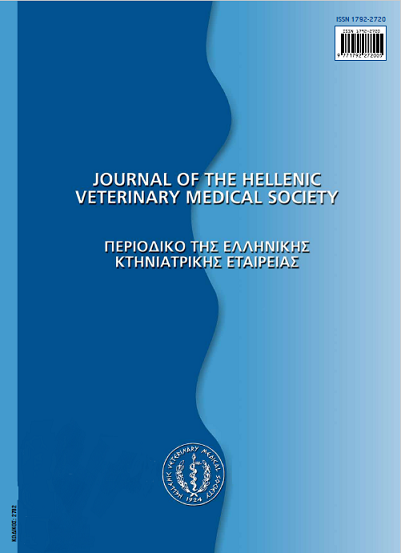Ανίχνευση αντισωμάτων έναντι του Mycoplasma gallisepticum και του Mycoplasma synoviae σε νεοσσούς και ορνίθια κρεοπαραγωγής

Περίληψη
Κατά τη δεκαετία του 1990, στην Κλινική Παθολογίας των πτηνών, εξετάστηκαν 882 οροί για την ανίχνευση αντισωμάτων έναντι του Mycoplasma gallisepticum (M.g.) και του Mycoplasma synoviâe (M.S.), που συνήθως εμπλέκονται στα αναπνευστικά νοσήματα των κρεοπαραγωγών ορνιθίων. Από τους ορούς αυτούς, οι 188 προέρχονταν από νεοσσούς ημέρας και οι 694 από κρεοπαραγωγά ορνίθια με αναπνευστικά προβλήματα. Η μέθοδος που εφαρμόστηκε ήταν η ταχεία οροσυγκόλληση σε πλάκα. Από τους ορούς των νεοσσών, 40 (ποσοστό 21,27%) ήταν θετικοί έναντι του M.g., ενώ 76 (ποσοστό 40,42%) έναντι του M.s. Από τους ορούς των κρεοπαραγωγών ορνιθίων, θετικοί έναντι του M.g. ήταν 133 (ποσοστό 19,16%), ενώ έναντι του M.s. 356 (ποσοστό 51,29%). Όπως φαίνεται από τα αποτελέσματα της μελέτης αυτής, η συχνότητα των θετικών ορών ως προς το M.s. είναι υψηλότερη σε σχέση με αυτή ως προς το M.g, τόσο στους νεοσσούς, όσο και στα κρεοπαραγωγά ορνίθια. Το γεγονός αυτό δείχνει και τη μεγαλύτερη σπουδαιότητα που παρουσιάζει το M.s. στην εμφάνιση των αναπνευστικών νοσημάτων στα πτηνά αυτά.
Λεπτομέρειες άρθρου
- Πώς να δημιουργήσετε Αναφορές
-
GEORGIADES (Γ.Κ. ΓΕΩΡΓΙΑΔΗΣ) G. K. (2018). Ανίχνευση αντισωμάτων έναντι του Mycoplasma gallisepticum και του Mycoplasma synoviae σε νεοσσούς και ορνίθια κρεοπαραγωγής. Περιοδικό της Ελληνικής Κτηνιατρικής Εταιρείας, 53(1), 33–38. https://doi.org/10.12681/jhvms.15357
- Τεύχος
- Τόμ. 53 Αρ. 1 (2002)
- Ενότητα
- Research Articles

Αυτή η εργασία είναι αδειοδοτημένη υπό το CC Αναφορά Δημιουργού – Μη Εμπορική Χρήση 4.0.
Οι συγγραφείς των άρθρων που δημοσιεύονται στο περιοδικό διατηρούν τα δικαιώματα πνευματικής ιδιοκτησίας επί των άρθρων τους, δίνοντας στο περιοδικό το δικαίωμα της πρώτης δημοσίευσης.
Άρθρα που δημοσιεύονται στο περιοδικό διατίθενται με άδεια Creative Commons 4.0 Non Commercial και σύμφωνα με την άδεια μπορούν να χρησιμοποιούνται ελεύθερα, με αναφορά στο/στη συγγραφέα και στην πρώτη δημοσίευση για μη κερδοσκοπικούς σκοπούς.
Οι συγγραφείς μπορούν να καταθέσουν το άρθρο σε ιδρυματικό ή άλλο αποθετήριο ή/και να το δημοσιεύσουν σε άλλη έκδοση, με υποχρεωτική την αναφορά πρώτης δημοσίευσης στο J Hellenic Vet Med Soc
Οι συγγραφείς ενθαρρύνονται να καταθέσουν σε αποθετήριο ή να δημοσιεύσουν την εργασία τους στο διαδίκτυο πριν ή κατά τη διαδικασία υποβολής και αξιολόγησής της.



